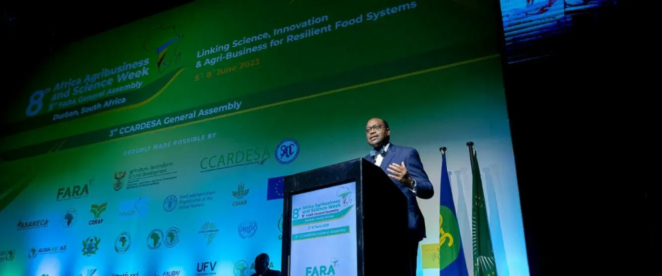Dr. Akinwumi A. Adesina, African Development Bank president, said Africa has the alliances and technologies to end hunger.
Adesina remarked Monday at the 8th Africa Agribusiness and Science Week (AASW) opening session in Durban, South Africa, that action and substantial finance are needed.
“We must pull together the best of science, technology, and innovations to drive a more productive, efficient, and more competitive agricultural system,” Adesina told African agriculture and agribusiness research and innovation stakeholders.
The event was organized by FARA, the South African government, the African Union Commission (AUC), the African Development Bank, and the Consultative Group for International Agricultural Research (CGIAR). IFAD, UNIDO, and the European Commission are also partners.
AUC Commissioner for Rural Economy and Agriculture Ambassador Josefa Leonel Correia Sacko stated the event could not have occurred at a better moment because of the global hunger epidemic caused by cascading causes like COVID-19 and climate change.
Africa can end hunger with the help of technology and ingenuity.
She said Africa should use its resources, especially research, to prevent shocks. She advised the continent to use its young population and vast natural resources. Unlock our potential… Sacko advised feeding Africans and the globe.

Alioune Fall, FARA Chair, discussed how climate change affects agriculture. “Climate change and its effect on the continent require new ways of doing things in almost all facets of our society,” Fall said. “Africa’s young farmers would not adopt nature-based approaches unless “they are nicely packaged, inexpensive and technology-serviced.”
Adesina claimed African food systems might generate $1 trillion over seven years. “For that, we must strengthen and support the CGIAR with a lot more resources, ensure that it works in and delivers for Africa based on our priorities, and support regional research and development institutions, such as FARA and the sub-regional agricultural research organizations,” he said.
In January, the African Development Bank hosted the Feed Africa Summit in Dakar, Senegal. 34 leaders attended.
“We developed Food and Agricultural Delivery Compacts for 41 countries with development partners from around the world, the African Union Commission, private sector companies, and global and national agricultural research centers,” Adesina added. Summit partners have raised $72 billion for national compacts based on its performance, he said.
2016 saw Adesina win.
Adesina awarded the 2023 FARA Leadership Prizes for Advancing Agricultural Science, Technology, and Innovation in Africa to World Trade Organization Director General Ngozi Okonjo-Iweala, Ambassador Sacko, FARA Executive Director Dr. Yemi Akinbamijo, Senegal’s former Minister of Agriculture and Rural Infrastructure Papa Abdoulaye Seck, and Afreximbank President Prof. Benedict Oramah.
The 8th Africa Agribusiness and Science Week, the main continental platform for stakeholders of agriculture and agribusiness research and innovation in Africa, brings together 1,500 stakeholders every three years to assess progress, share information, form business alliances, and set priorities for joint action. In June 2016, Kigali hosted the eighth AASW.

